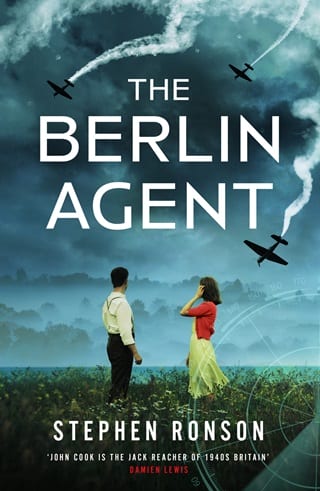11
I drove down from the Forest, the road swallowed up by a tunnel of trees. I could have had my lights on full and no German airman would have seen me.
The police constables had arrived, breathless with excitement. Young men, who’d grown up with the tales their fathers told, ready to do their bit. They’d approached the parachute the way I’d approach an angry bull, abundant caution mixed with a sense of awe at being in the presence of something with a power beyond the everyday.
As I drove, I let my mind wander. Vaughn Matheson. A name from the past. A name I hadn’t expected to hear in the Sussex countryside.
When he’d stepped forwards to shake my hand, I’d been curious to see if he’d recognise me. We’d met before. I had a suspicion he wouldn’t remember, and I’d been right. But I remembered.
I remembered very clearly.
It was 1916. I was a new private, my first rotation into the front line. Four weeks of training at Aldershot, drilling on the parade ground, a chaotic few weeks being shuttled around between reserve bases in northern France. All too soon, the orders we’d all been waiting for and dreading. The long, slow train journey in a cattle wagon, the march to the support trenches that had until recently been the enemy’s front line, fragments of bodies still embedded in the mud. The final march as far as the linking trenches would allow, slithering over the top and hugging the ground across an exposed wasteland to get to the front line.
I’d dropped down into the forward trench as an enemy mortar hit our line ten yards to my left. The zigzag of the trench layout protected me from the shockwave, but the cloud of red mist mixed in with the cordite showed me some of my mates hadn’t been so lucky. When my sergeant major slid down into the trench beside me and asked for volunteers to carry shells back from the front line to our artillery positions in the rear, my hand went up as if it had a mind of its own.
I was to be part of a small party of mud-covered -Tommies, slipping on duck-boards, plunging waist deep into a soup of mud, oil, and human waste, carrying my armful of brass shells. My first initiation into the fact that most of soldiering is moving heavy things from one place to another and back again.
The artillery position was a mile behind the line. A gunner took my shells, one by one, like a well-rehearsed rugby -manoeuvre. Each shell passed from man to man, rammed into the rear of the massive gun, steel door slammed shut and locking mechanism rotated into place, the order given, the gun fired. Each shot, the gun bucked, straining free of its shackles, landing with a crash that shook the ground. Each shell traversed the sky, presumably landing beyond the horizon. Out of sight, out of mind. Then the gun breech was opened, with a cloud of smoke, the empty shell removed, and the process repeated.
I found myself alone, ashamed of myself for being so quick to volunteer to leave the line. I was about to slip away when the gunnery sergeant spotted me and pressed me into another mission. A message to take to the higher-ups, -further behind the line. All things considered, not the worst thing.
The officers’ mess was a ruined church, two miles back from the artillery position. Three miles from the front. As close to the fighting as many of the senior officers liked to get, preferring to learn about conditions on the ground from three-day-old copies of The Times that were shipped over from England along with their freshly laundered shirts.
My message was for Captain Vaughn Matheson. He wasn’t in the officers’ mess, and nobody knew where, or when, he’d turn up. I wrote the whole thing off as a bad job, and left the letter for him, in the care of an aging batman who must have started his military adventure when Victoria was a young woman.
The day was warm, and this far from the front the countryside was pleasant, not so different from the fields and woods I’d been desperate to leave behind in Uckfield. I took my time on the way back, towards the front lines.
I heard an elderly woman shouting, the sound coming from the ruins of a farmhouse a hundred feet up the road. I didn’t understand French, but I understood she was angry. None of my business, I thought, as I neared the house. The shouting got louder. There was a pistol shot, muffled, fired in the confines of an enclosed space, the sound dampened by thick stone walls. The shouting stopped. I stopped walking.
Another voice started up, an elderly man, remonstrating. Another shot. Then a third.
I stood in the road, exposed, planning my response if a rogue German came running from the farmhouse. But it wasn’t a rogue German. It was an English officer, dapper in his spotless green breeches and puttees, and his ironed white shirt. He strolled out of the farmhouse holding a painting under his arm. He was whistling.
He noticed me, and his smiled slipped, just for a second.
‘Don’t you know you’re meant to salute an officer,’ he said.
I looked from him to the farmhouse, and then back to his face. He was watching me closely, putting two and two -together. He knew what I’d heard.
I raised my hand and snapped a salute, clicking my heels for good measure. I kept my eyes locked on his, wondering what it would take to wipe away the smirk.
‘What’s your name, private?’ he asked.
‘John Cook,’ I said. ‘Eleventh Battalion, Royal Sussex.’
I paused, counted to three silently. One. Two. Three.
‘Sir.’
*
When I came to Maresfield, with the road to Uckfield laid out in front of me, I took a right turn instead, past the watchful sentries at the army camp, through the lanes to Isfield, to Margaret.
Isfield Park was dark. The staff had been reduced to bare bones, and they all lived in the village. How much longer did these old houses have? Relics of a different age that wouldn’t be missed by many.
The kitchen door was unlocked. Nothing worth stealing, Margaret had told me when I’d suggested she raise her level of security. She’d said it with such a level of challenge I’d known better than to press the issue.
The house was silent, and I was loath to disturb it. I didn’t belong here. The house knew it as well as I did. I passed through room after room, all empty of furniture, stripped of anything of value over the years. One room was lined with empty shelves, and I lingered, imagining the great library that must have once been housed there.
The stairs creaked as I made my way up to the first floor. I was still new enough here that I hadn’t worked out which steps to avoid, or where to tread. I waited for Margaret to call out. Perhaps she was asleep.
Margaret’s rooms were at the far end of the long corridor. She’d dragged every scrap of furniture she could find into a suite of rooms and made the best of it. The first time she showed me, I asked why she didn’t choose rooms nearer the stairs, to minimise the walk. She’d chosen the old nursery, she said, because that was where she’d stayed when she’d visited her aunt as a child.
The bedroom was empty.
I sat in a sagging armchair in a dark corner of the bedroom, my back to the wall, facing the door, listening to the creaks of the empty house as the wind picked up outside. Margaret was probably at the pub. It was after hours but who was counting. Easy enough for the landlord to lock the door and have a quiet drink with a few of his regulars until they ran through their pay packet. The chair was damp. Everything in this house felt damp; the humid summer combined with centuries of cold leaching out of the stone walls.
I must have dozed off. Voices intruded on my half-sleep. Murmuring. Urgent. I was in a dugout, at the Somme. Huddled in a greatcoat passed down from a German lad who wouldn’t need it any more, pressed into the damp earth, hoping it would absorb me. Feeling the thump of shells and smelling the soil that would claim me. The soil of the farm I’d turned my back on, only to find again on the other side of the Channel. Earth to earth.
I felt Margaret’s hand on mine. Her hair smelt of cigarette smoke.
We undressed quickly, fumbling in the dark, silent in the empty house.
We tunnelled under the covers that felt as damp as everything else in the house. I pulled her to me, my arm around her waist, tracing the curve of her lower back. I met her urgent kiss, her tongue flicking mine, sending a bolt of lightning through every nerve in my body.
She pushed me back, and climbed on top of me, her hair falling down onto my face, a curtain between us even in the darkness. She groaned as I slid into her and she flattened her body against mine. She was a life raft holding me up to the surface of a dark sea, keeping me from dreams of earth and greatcoats and the concussion of shells creeping ever nearer.
‘You’re a good man, John Cook,’ she whispered to me, her head resting on my shoulder. She was lying, of course, and we both knew it, but I was glad she thought enough of me to say the words.
 Fullepub
Fullepub 



